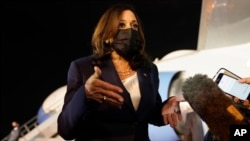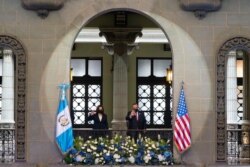U.S. Vice President Kamala Harris says she will discuss Mexico’s role in the region as she meets with President Andrés Manuel López Obrador in Mexico City on Tuesday as part of her trip focused on addressing a rise in migration to the southern U.S. border.
Speaking to reporters late Monday, Harris mentioned the close partnership between the neighboring countries and said Tuesday’s agenda would also include economic engagement and cooperation regarding COVID-19 vaccines.
U.S. officials said Harris and López Obrador will witness the signing of a memorandum of understanding regarding cooperation on development programs in the Northern Triangle countries of Guatemala, El Salvador and Honduras.
Ricardo Zúñiga, U.S. special envoy for the Northern Triangle, told reporters ahead of Tuesday’s meetings the United States and Mexico “have not had this level of cooperation in Central America before.”
“The main thing is that it’s very important to show that the United States and Mexico are collaborating and trying to improve conditions on the ground among our neighbors because of the importance that the countries in Central America have for both of us,” Zúñiga said. “We’re both destination countries for migration from Central America, and we both have some of the same issues trying to ensure that we have legal paths for migration and temporary labor.”
While in Mexico City, Harris will hold talks with entrepreneurs and labor leaders as well.
She carried out a similar schedule Monday in Guatemala, where she emphasized “the power of hope” along with new efforts to fight corruption and persuade Latin Americans to stay home rather than attempt the dangerous migration north to the United States.
“I am here because the root causes are my highest priority in terms of addressing the issue, and we need to deal with it, both in terms of the poverty we are seeing, the hunger that we are seeing, the effects of the hurricanes and the extreme climate conditions, what we are seeing in terms of the pandemic,” Harris told reporters.
In her first foreign trip as the U.S. second in command, Harris said at a news conference in Guatemala City that Latin Americans “don’t want to leave the country where they grew up.”
But she said people in Guatemala, Honduras and El Salvador, along with Mexico, need economic development that promises a better life than trying to move to the United States.
Harris said that “help is on the way,” with Washington aid and private investments encouraged by the U.S. government in agriculture, housing and businesses. “We have reason to believe we can have an impact,” she said.
But Harris also sent a warning to Guatemalans: “Do not come” to the United States. “We’re not afraid to enforce our laws and borders,” she said.
Harris held what she described as “very frank, very candid” talks with Guatemalan President Alejandro Giammattei about corruption in his country, pressing the need for “a strong court system” and civil governance.
Shortly after she met with the Guatemalan leader, U.S. Attorney General Merrick Garland announced in Washington the creation of a law enforcement task force aimed at fighting human trafficking and smuggling groups in Mexico and the Northern Triangle countries.
“We are creating this task force to address corruption, to address human smuggling — doing the work to make sure certain progress be made if we are going to attract investment,” Harris said.
She said the task force would combine resources from the Justice, State and Treasury departments.
At the news conference, Giammattei blamed drug traffickers for corruption. He said the United States and Guatemala agreed to create a “very simple process” through visas to permit regular migration to the United States, and that the two countries would prioritize family reunifications.
He also announced a new processing center for migrants sent back from Mexico and the United States.
Besides meeting with Giammattei, Harris participated in a roundtable with Guatemalan community and civil society leaders and then met with young innovators and entrepreneurs, including several female entrepreneurs.
“This afternoon, I got to see what students in Guatemala are working on in the lab — and hear about how local entrepreneurs are growing their local economies. Around the world, innovators and entrepreneurs create economic opportunity. We must support them,” Harris tweeted late Monday.
Harris’ trip is fraught with U.S. political implications, with Republicans blaming President Joe Biden and Harris for the surge in migrants trying to cross the country’s southwestern border with Mexico. In the most recent count, U.S. border agents faced 178,000 migrants at the border in April, 44% of them from Central America.
At her news conference, Harris deflected a question about when she would visit the border, even though she has said she would at some point.
At a recent news conference, some Republicans displayed a milk carton depicting Harris with the headline: “MISSING AT THE BORDER.”
When asked about Republican criticism that she is not doing enough, Harris said Monday that she is focused on stemming migration as “opposed to grand gestures.”
Biden has tasked Harris with leading the effort to address the root causes behind the increase in the number of migrants traveling to the U.S.-Mexico border.
Ahead of her trip, Harris announced $310 million in U.S. aid to support refugees and deal with food shortages. She also recently won commitments from U.S. companies and organizations to invest in Central American countries to promote economic opportunity and job training.
The United States also said last week it would send 500,000 doses of coronavirus vaccine to Guatemala and 1 million to Mexico.






